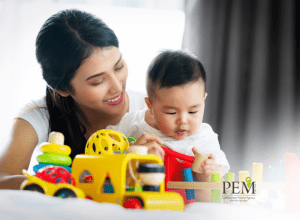[email protected] ♦ (+65) 6293 9249 ♦ Mon - Sun : 10:00AM - 7:00PM
Understanding your Baby’s Sleeping Habits

As a new mom, you should know that your newborn’s sleep patterns are completely different from yours. It may seem that only after a couple of hours after you’ve finally put your baby to sleep, he or she is awake and demanding your attention, much to your frustration. Sleeping throughout the night is what we desire of our babies. However, this is how a grownup sleeps, not a baby whose sleeping habits are totally different.
All those supposed problems with a baby’s sleep that you worry about are actually normal sleep routines for babies. Your baby is just doing what he is naturally programmed to do. By knowing what is normal for your newborn, you can then understand what’s causing the baby’s whimpers in the night and how to soothe the baby back to sleep. Moreover, understanding your baby’s normal sleep habits also ensures you carry out activities that support his sleep development, instead of disrupting it. Read on for more insight.
Shorter sleep cycles
Babies don’t sleep in one long chunk through the night and wake up in the morning. Instead, they sleep through a number of sleep cycles, which combine to form a night’s sleep. A typical sleep cycle comprises of two distinct phases of sleep; non-Rapid Eye Movement (nREM) sleep and Rapid Eye Movement (REM) sleep. Non-Rapid Eye Movement (nREM) often begins as a light sleep, and it gets increasingly deeper and more restful. On the other hand, Rapid Eye Movement (REM) sleep is characterised by dreams and rapid brainwaves.
You May Also Read this : 11 Ways To Get Your Baby To Fall Asleep Faster
Therefore, your baby begins with nREM sleep and goes into REM sleep, forming a full sleep cycle. Thereafter, a new cycle starts again. The baby returns to that drowsy and probable state of alertness at the start of a new cycle. At this point, your baby may need your help to get back to sleep.
A baby’s sleep cycle typically lasts for about forty-five minutes, which is shorter compared to that of an adult which lasts for one and a half hours. These shorter sleep cycles mean your baby has many sleep cycles every night. If the baby learns that when she gets into the state of drowsiness and there’s no cause for alarm since you’re available if she needs you, soon she’ll connect these together without your assistance.
More REM sleep
A baby’s sleep pattern is equally divided into nREM sleep and REM sleep. REM sleep is usually lighter and easier to wake up from. This means when your baby is in this segment of the sleep cycle; she might get awakened more easily due to light, noise or any environmental changes. Therefore, you should curtail any stimuli that could possibly wake her up, and keep her environment unchanged. Moreover, the increased REM sleep is also characterised by more dreams which can disturb the baby and wake her up. You or your hired help, in this case, a confinement nanny should provide a sense of reassurance to the baby to get her back to sleep.
Your baby has no circadian rhythm
Adults have an internal body clock known as circadian rhythm which determines when it’s time to sleep or wake up based on the presence or absence of natural light. In contrast, a newborn does not have a circadian rhythm which means she can’t differentiate night and day and thus will sleep and wake up randomly throughout the 24-hours.
Your baby needs several months before they can develop their own circadian rhythm. In the meantime, you need to expose her to as much natural daylight during the day and darkness during the night. During the daytime, let the baby nap while the blinds are up. During evenings and nights, keep the baby’s environment dark with sleep shades and blackout blinds.
In conclusion, understanding the reasons why your baby is sleeping the way she does can help you provide her with much-needed comfort and get both of you on the way to comfortable and peaceful nights.







